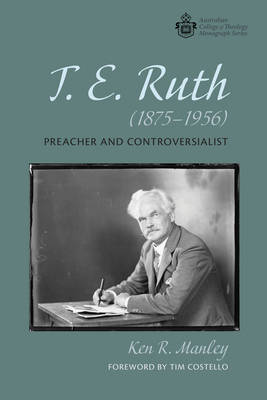
Je cadeautjes zeker op tijd in huis hebben voor de feestdagen? Kom langs in onze winkels en vind het perfecte geschenk!
- Afhalen na 1 uur in een winkel met voorraad
- Gratis thuislevering in België vanaf € 30
- Ruim aanbod met 7 miljoen producten
Je cadeautjes zeker op tijd in huis hebben voor de feestdagen? Kom langs in onze winkels en vind het perfecte geschenk!
- Afhalen na 1 uur in een winkel met voorraad
- Gratis thuislevering in België vanaf € 30
- Ruim aanbod met 7 miljoen producten
Zoeken
Omschrijving
T. E. Ruth (1875-1956) was one of the most controversial Baptist ministers ever to serve in Australia. After a successful career in England as preacher, pastor, and writer, Ruth came to the significant Collins Street Baptist Church in Melbourne in 1914. During the tumultuous years of the World War, Ruth cared for the bereaved and bewildered people in his congregation and in the city. He also led public debates about conscription, engaging in intense platform clashes with his Catholic opponent, Archbishop Daniel Mannix. He later moved to the Pitt Street Congregational Church in Sydney where he was soon involved in public opposition to the Labor premier J. T. Lang as well as becoming a popular columnist in the secular press. To his critics he was a "sectarian bigot" and was mocked as "Ruthless Ruth"; to others, he was an ardent Empire loyalist, an admired and successful Protestant defender. Some critics accused him of being a Christian spiritualist and others have suggested that he formulated a theology for fascism. Ruth denounced millennial Adventism and hellfire eschatology as he affirmed universalism and a continuing spiritual development after death. This fascinating study of a progressive thinker, public theologian, and controversialist illuminates one of the more divisive and formative periods in Australian religious and political life.
Specificaties
Betrokkenen
- Auteur(s):
- Uitgeverij:
Inhoud
- Aantal bladzijden:
- 368
- Taal:
- Engels
- Reeks:
Eigenschappen
- Productcode (EAN):
- 9781725299603
- Verschijningsdatum:
- 22/07/2021
- Uitvoering:
- Paperback
- Formaat:
- Trade paperback (VS)
- Afmetingen:
- 152 mm x 229 mm
- Gewicht:
- 489 g

Alleen bij Standaard Boekhandel
+ 116 punten op je klantenkaart van Standaard Boekhandel
Beoordelingen
We publiceren alleen reviews die voldoen aan de voorwaarden voor reviews. Bekijk onze voorwaarden voor reviews.









